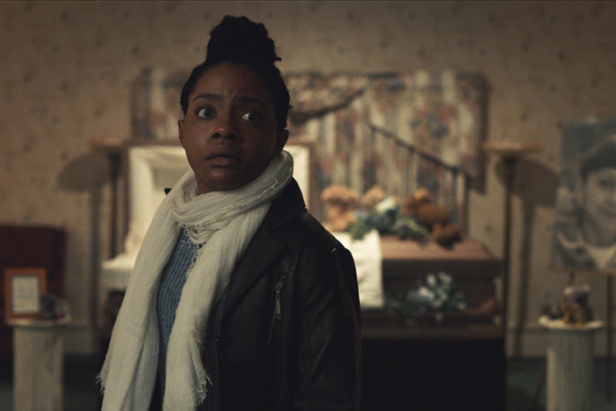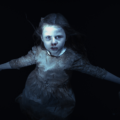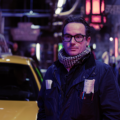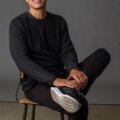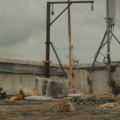“Worming itself into your brain and clinging there long after its hauntingly bleak finale has unfolded, The Harbinger is a real humdinger, or Har-banger, that you will not soon forget.”
That’s what we said about The Harbinger last summer when we saw the movie at Frightfest. So, after finding out the movie is to be released in the UK this month, we had to sit down with its writer and director Andy Mitton to find out more.
Set during the Covid-19 pandemic, The Harbinger sees Monique (House of Cards’ Gabby Beans) breaking her bubble with her family to check in on an old friend Mavis (The Plagiarists’ Emily Davis) in NYC who is plagued by horrific nightmares from the beyond. However, Monique soon finds out that not only are the nightmares caused by a plague mask-wearing demon, but they’re also contagious…
So, how did everything begin for you with The Harbinger?
In 2020 I was just another person whose plans were cancelled, like everyone else’s. There was a movie we were trying to set up for that summer and it clearly wasn’t going to happen. We were holed up with my mother, we had just sold our house and had nowhere to go.
I’m a pacer. So I was pacing the floors of the basement outside of Boston and the muse came down and hit me one night as I was trying to process all the same feelings of dread that everyone else was living in.
Is there something we can do with this that’s honest and sincere and not just trying to take advantage of a horrible situation for the sake of a horror movie? This idea struck me and even before I wrote it, I was on the phone with Richard King, my producing partner, and we were talking about the pros and cons of taking COVID on without being able to see into the future.
We were talking about Jacob’s Ladder as a tonal touchstone for what we wanted to do as we both fell in love with that movie at an early age. Then we decided it was worth a swing. If we could do it with enough grace, if it turned out well and there was a bit of catharsis but also a horror movie that satisfied just as a horror movie, then that would be a good thing to shoot for.
Then a draft flew out of me. I probably had a draft within a month of that phone call and we were shooting just four months after that!
Did you shoot the movie during the pandemic?
It was shot pre-vaccine in the pandemic! Vaccines were just coming out.
It was funny; my whole crew had been working the whole time, like a lot of people in film crews were but I was coming out of a bubble. It was really wild but in the end it was a lot of fun. This felt like a family and we had a really good family environment.
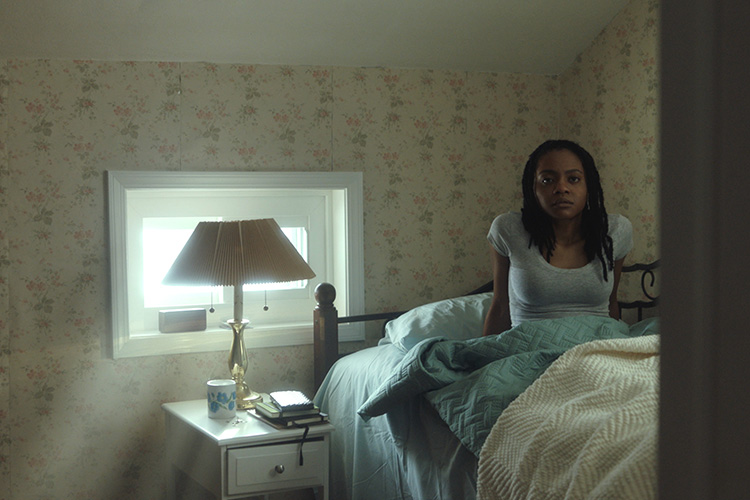
What’s it been like for you when watching the movie to look back at that time?
It’s a lot of things. What I’m seeing in audiences as I travel around and see it is that everyone brings their own personal experience. There are, I think, compartments we’ve put things in and memories that we’d rather put behind us than process. That’s been my experience. Horror in particular is a good way to process some of the stuff that we don’t want to take in a straight drama.
You mentioned that you wrote the movie quite quickly, did much change from that initial idea to what we see on screen?
The core idea remained the same, but a lot of other things changed. I think it has to. That’s part of what I love about screenplays; there are these margins that you build in purposely that are going to be filled in by other artists, by better ideas than yours. And when those better ideas come you’re better able to install them before you shoot.
Everyone who we brought on brought something new and something that made me want to tinker. The location as well was a big deal – we found this old ruined opera house and it was full of all these amazing decrepit textures. It was terrifying. I had to go around and spend time in the building and actually rewrite the script and all the dream sequences to make sure we were taking advantage of our location. I love that process and trying to stay flexible up until you’re rolling.
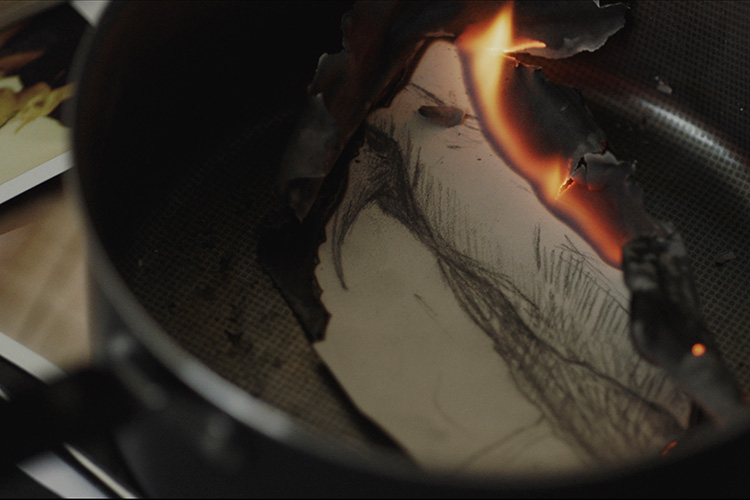
In the movie, there are plenty of legends surrounding The Harbinger – did you do much research into demon mythology?
I say this with a little bit of shame (but only a little bit): No, I just made it up.
There was someone who got really excited at an early Q&A, who was maybe into demonology who really wanted the other answer to that. I could see their face fall when I was like “I made it up!”
The main protagonists are old friends – why did you decide to have the two main characters have this particular relationship?
Again, everyone had their own experience, but at least for me, family was part of the advantage we had [during the pandemic] as we could build bubbles around our families.
But our friends were often in their own bubbles and part of what made me want to write this is… I had a friend who once said to me that ‘life is a series of relationships’. That’s the best definition of it and I think we all got a hard reminder that the fabric of our identity has to do with each other and our connections to each other and our ability to go see our friend or help our friend when they ask for help. To not be able to do that during that time and to not be able to even go to the bedside of someone who is in the process of losing their life…
I think there was something more potent in that for me with friendships, so I decided to run with that and the idea of leaving your family and endangering that bubble because of a loyalty to a friend and someone who’s in trouble. Because without the ability to do that, who are we?
The Harbinger attacks Mavis and Monique in different ways. Why does he do that?
The Harbinger tries to find your particular weakness because his goal is to break you down and take your isolation and make it worse and amplify it and lean into it. So he finds whatever cracks, whatever fissures have created in your life at that time.
I think with Mavis, he’s really been playing the long game with her. I think she had a bigger slope to go down. I think her life was really busy and full of clients and she had a lot going on. So I think getting into her dreams took a lot longer and she ends up with less hope in her to face it.
With our protagonist Monique there is hope and there is buoyancy. She is the steady one who we hope can ground the situation. So his way into her is very different. It has to do with her own history and her mother and her memories. So I like the way the antagonist can personalise his approach.
It isn’t just this masked figure; he’s the designer of dreams that get right to the nerve of a particular person.
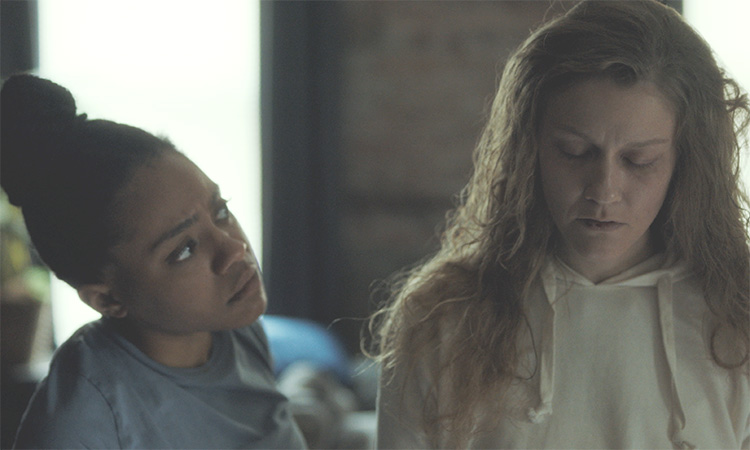
Monique goes through one hell of a journey in The Harbinger. How closely did you work with Gabby Beans for the character?
Gabby Beans is amazing. We worked closely but also from the first time she read it, she felt a connection to the character. She had an easy way in. She was inspired and so she brought a lot to the table. She came on not too long before we shot actually. She came late to the process but it never felt that way. It felt like we landed on our feet and she was just such a wonderful collaborator.
Most of the actors on this were stage actors who would have been in any other world in the midst of a run of a show in the theatres in New York, which was shuttered.
My degree is in theatre and I’ve always thrived in that environment so I just loved these collaborations, for a lot of reasons. We were all just theatre animals getting down in it together. Theatre actors are great, they learn the whole scene. You can shoot the whole scene in a master and they know all their lines, it’s the best!
The Harbinger’s look is very creepy! How did you go about creating that look?
I’ve always been scared of the plague doctor image or anything that reminded me of it. Any beaked person is wrong [haha!].
So I started there. I knew I wanted to evolve it beyond the familiar image to make it distinct to the film. But I wasn’t quite sure how and Yong Hui Park was not only our special effects and mask person, but the hair and makeup in the movie as well. She was really instrumental in giving him textures.
We talked about the bird that had the perfect beak and the perfect arc – it was a California Thrasher if anyone’s interested – and we made it as violent an arc and as sharp a point as we could without breaking the neck of the poor actor wearing it.
What was really interesting is how it starts. Our goal is that it starts reminding us of the mask but as we get closer, the textures are organic. You’re getting the sense of skin more than mask and by the time the movie evolves, it’s actually something that can bleed. So blurring the line between mask and bird and creature was really fun.
What kind of scares can audiences expect from The Harbinger?
Hopefully all kinds! It’s not loaded with jump scares but I am a fan of a good healthy surprise. So there are some good healthy surprises that I can attest to. I’ve sat in theatres, and there are butts leaving seats!
So there are a couple of those but really, I think there’s a dread and hopefully a catharsis for the actual dread. Everyone is bringing their own experience to it, so the way people are scared in the theatre tends to vary for what people are bringing to it with what they need to process. Or, if at that moment, they just need a roller coaster ride. I think that’s there for them as well.
That’s how I tried to build it. I always check in with the versions of myself that fell in love with horror at 12 or 13, that no matter how heady I get with my own ideas or how excited I am about doing something more grown up with my stories, I’m always checking back in with that dude and saying like, ‘are you happy too? Do you like this? Would you rent this?’ So that’s the hope.
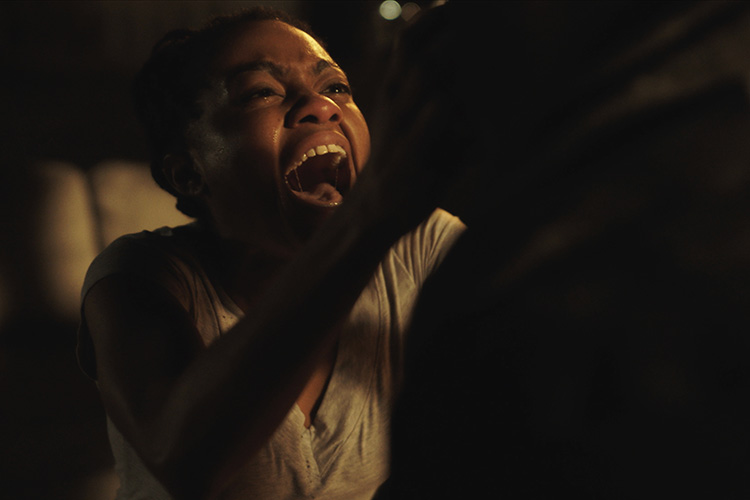
Why do you think we horror audiences love the genre so much?
Because we know we’re safe. Ultimately, somewhere in us we know we’re safe in those spaces. So we can look at anything. We can look in the dark corners and we can open the valve on something that I feel like people outside of our community are just holding on to.
When I look around the horror community it’s no wonder that this is the warmest, most loving film community. Compassionate, organised… all the things that you get from working in horror. That’s from the community and I think they’re just letting stuff go that everyone else is holding on to. I think it’s nothing but a great thing.
I say that as a complete wimp for non-fiction. If I see something real, that’s violent, I take that to my grave. I’m a complete wimp. But I’ve known since I was a kid what is fiction and something in me knows it. I tell my kids when someone dies in a movie that they’re watching, I’m like, ‘trust me, they’re on their way for a sandwich at the kraft service table’. So now when anyone dies, they’re like ‘he’s getting a sandwich, right?’ [haha].
Did pull on any horror influences when making the film?
I tend to do that work before I write. You’re always standing on the shoulders of Freddy Krueger. So you have to think about that if you’re doing dream movies, or because those are the rhythms we expect, so you have to bounce off that.
Something else that got in was the documentary The Nightmare about sleep paralysis. It’s terrifying. It’s just about people’s common experiences of sleep paralysis around the world, which is fascinating because there’s so much in common with what they go through and the figures that they see in their bedrooms.
There’s a danger in the film that now you’re watching it, you’re like, ‘am I going to have this now because I’m watching it?’ I like that little edge. I wanted just a touch of that danger in this film, so I absorbed all that stuff.
What I really want is to make something distinct that has its own fingerprint. So when I’m designing shots, I’m never like ‘this is the Nightmare on Elm Street shot’ I’m always just ‘what’s the best shot for the story for the character at the time?’.
The Harbinger explores some dark themes like suicide and grief – what makes genre a good platform to explore such heavy subject matters?
I think there’s a lot going on, especially nowadays in horror. Explorations of mental health, depression, those elements. They’re, unfortunately I think, more prevalent, but fortunately, we’re also more cognisant of those topics. Those topics are brought up and discussed more. I think you have to be careful when you’re in that territory, because again, everyone has their own experience that they’re bringing to it.
That’s a lot on the actors – that they bring a lot of depth and grace and humanity to what they do. I think horror is an excellent place to process that stuff for the same reason. It’s a great place to process all the difficult stuff. Horror tends to be there for whatever we need at the time and right now, a lot of us need to address these topics, but again, hopefully with a balance of grace and fun and not leaning too much into it.
It’s a tricky tightrope act for sure but that’s my guess. That’s what I see going on in the space. I’m not always sure why it ends up in my stories. My own muse is sometimes a mystery to me!
What do you want for audiences to take away from the movie?
I hope that they got what they need. I’ve seen people take different kinds of good experiences from watching this movie. I’ve seen people who had really difficult experiences, for who this was touching a lot of nerves, who really found a lot of catharsis. I think that’s there for you, if you want to go there, and if that suits your experience. The roller coaster is also there for you and I think there are different kinds of hope.
So hopefully, it’s built to satisfy the needs of the moment but more than anything, the movie is looking at stuff that we don’t always want to look at. So my hope is that people come out of it, whether or not they thought they wanted to look at it, glad they did and there was a valve in them that got released, something got out that they didn’t maybe even know they were holding on to and that they’re better for it in a tiny way. That would be nice.
FrightFest Presents and Signature Entertainment releases The Harbinger on Digital Platforms 23 January.
